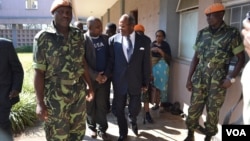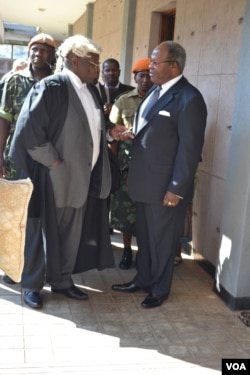It has been almost a decade since former Malawi President Bakili Muluzi was arrested on corruption charges, but his trial has made little progress. A judge will rule Friday on another request for a 30-day postponement.
Muluzi, 73, and his former personal secretary, Lyness Whiskey, are accused of stealing 1.7 billion Malawian kwacha ($12 million) during his 1994-2004 presidency. The funds came to Malawi as aid from Taiwan, Morocco and Libya.
The former president has always said the charges were politically motivated.
The lead prosecutor in the case recused himself a month ago, citing personal reasons. The trial was to resume Monday, but the new prosecutor said a key witness was not available and asked the judge for 30 days to review the charges.
Tamando Chokotho, the lead defense counsel, also said he would need more time to prepare.
“You should realize that this is quite a bulky matter," Chokotho said. "It involved a lot documents and a lot of evidence. And if the case is changing in any way, we will need quite some time to prepare fully.”
The trial opened in 2009 but has been subjected to several adjournments, partly because of Muluzi’s hospitalizations related to spinal problems. Both sides reject allegations that they have been deliberately delaying proceedings.
Political meddling?
Some see political interference in the delays. Muluzi is part of the opposition UDF party, but the ruling DPP party recently joined forces with the UDF in parliament, and Muluzi’s son, who is president of the UDF, is a cabinet minister.
Political analyst Vincent Kondowe said that "when cases are not given the impetus and the momentum which they require, you begin to question the political willingness that is there to prosecute people in public offices who are accused of plundering public resources.”
State anti-corruption officials deny that political interference is responsible for the delays, but Malawians are getting impatient. Local press reports this month said the state had spent as much as $12 million on the case. The government did not respond to a request for comment on that figure.
Erick Matola, a teacher in Blantyre, said, "The funds which are being used to prosecute this case are public funds, to which I contribute through tax. Therefore, I see that it’s a waste of resources.”
Malawi's anti-corruption enforcement has been under a microscope since 2013, when an audit revealed public officials had stolen $32 million in public funds.
The Cashgate scandal, as it was called, led to about 70 arrests and prompted the European Union and other foreign donors to cut aid. Malawi lost about $150 million in annual assistance. Much of that aid remains suspended pending reform of Malawi’s public finance system.





